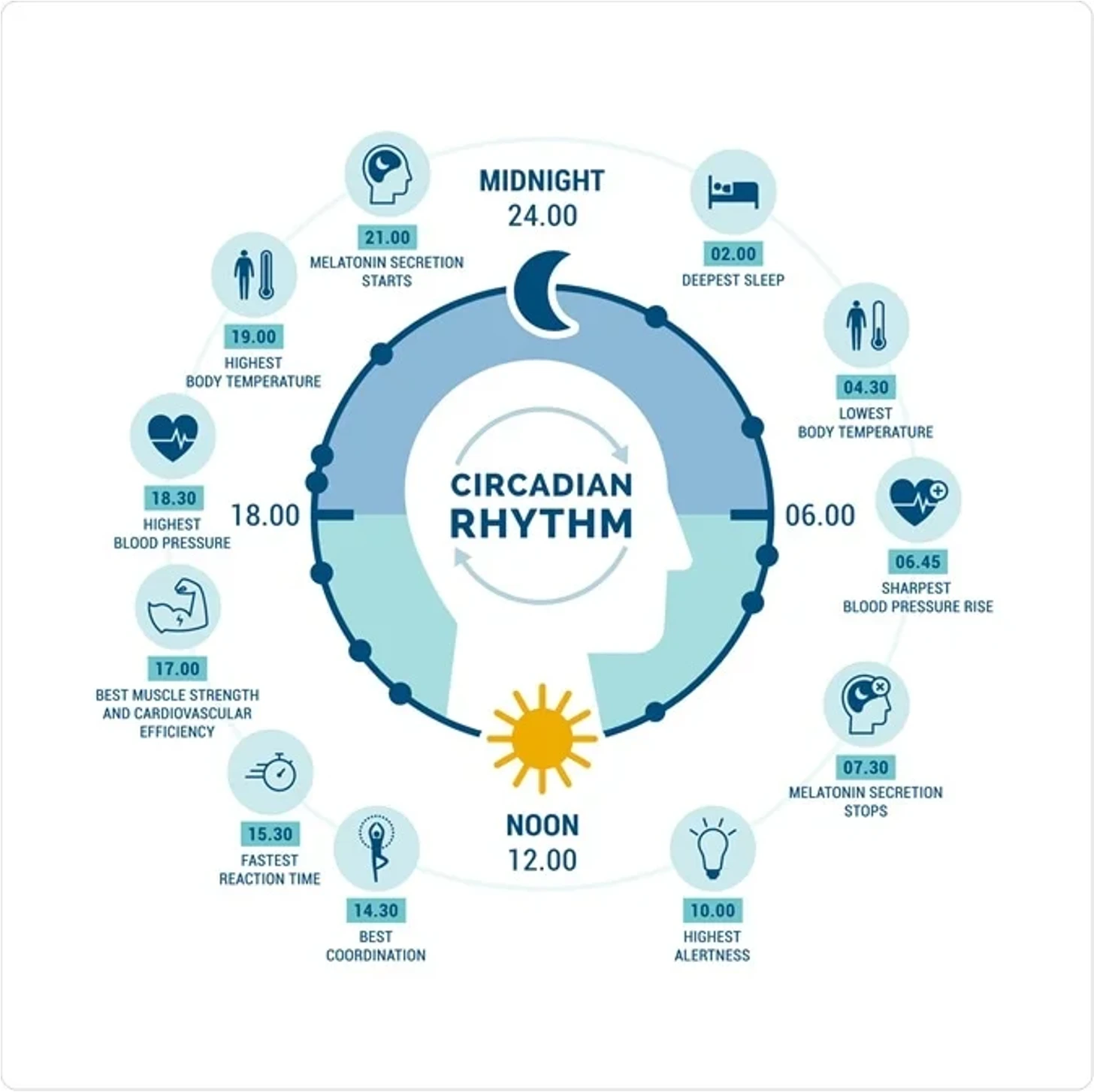How to Work Night Shift & Stay Healthy: Tips & Daily Routine Ideas

04/26/2025
Key Takeaways
- Set a consistent sleep schedule to align with your night shift routine.
- Ensure your sleep environment is dark, cool, and quiet to promote better rest.
- Incorporate healthy snacks and stay hydrated during your shift.
- Exercise before your shift to boost energy and reduce stress.
- TTEC offers great pay, solid wellness perks, and flexible schedules that help night shift employees truly thrive.
Night Shift Challenges
Working at night can lead to several challenges, primarily because our bodies are naturally programmed to be awake during the day and asleep at night. This natural cycle, known as the circadian rhythm, regulates sleep-wake patterns, hormone release, and even body temperature.

Also, night shift workers often face social challenges, such as missing out on family events or social gatherings. This can lead to feelings of isolation or stress, which further affect one's health.
That’s why it’s super important to keep your health in check while working the night shift. And when we say maintaining good health, we’re not just talking about getting enough sleep—we mean building a holistic routine that supports your physical, mental, and emotional well-being.
Join TTEC: A Global Leader in Customer & Employee Experience
TTEC, a customer experience innovator, operates across 6 continents in countries such as Greece, Poland, and India, and employs over 55,000 individuals fluent in 50 languages. Our commitment to excellence is evident in our award-winning culture, highlighted by our 2024 accolades like Top 10 Operations Teams, Silver Certification in MLT’s Black Equity Program, and recognition as one of the UK’s Best Workplaces.
With an employee satisfaction rating of 4.1 out of 5 on JobStreet, we pride ourselves on creating supportive and flexible work environments that enhance both employee and customer experiences. Find a variety of client-facing and business support roles within a company that values community connections.
Explore What's Possible at TTECImproving Sleep Hygiene
Creating a Sleep Schedule
First things first, choose a specific time to go to bed and wake up, even on your days off. This helps regulate your body's internal clock. If you're transitioning from a day shift, gradually adjust your sleep time by one hour each day until you reach your desired schedule.
Try to avoid caffeine at least four hours before your bedtime to ensure it doesn't interfere with your sleep.
Sleep Environment Tips
Ensure your bedroom is conducive to sleep by making it dark, cool, and quiet. Consider using blackout curtains or an eye mask to block out light, and use earplugs or a white noise machine to minimize noise disturbances.
Keep your bedroom free from distractions like electronics or bright lights, as these can interfere with your ability to fall asleep quickly and stay asleep throughout the day.
Power Nap Benefits
Power naps can be incredibly beneficial for night shift workers. A short nap of about 20-30 minutes during your break can help boost alertness and improve performance without leaving you feeling groggy.
If you have the opportunity, incorporate a power nap into your routine to recharge and stay focused.
Consistent Sleep Routine
Stick to your sleep schedule as closely as possible, even on your days off. This helps reinforce your body's new rhythm and makes it easier to transition back to your work schedule after a break.
Looking for a job where you're valued, not just scheduled? Check out the careers at TTEC to find your perfect fit.
Making Healthier Nutritional Choices
Meal Timing & Portions
When working the night shift, plan your meals and snacks strategically. Eating smaller, more frequent meals can help maintain steady energy levels and prevent overeating.
Aim to have a balanced meal before your shift, a light snack (e.g., protein bars) during your shift, and a healthy meal after your shift.

Importance of Hydration
Dehydration can lead to fatigue and decreased alertness, so make sure you're drinking enough water throughout your shift. Keep a water bottle handy and take regular sips to stay refreshed.
You can also incorporate herbal teas or infused water for a bit of variety. Just be cautious with caffeinated beverages, as they can interfere with your sleep if consumed too close to bedtime.
Healthy Snack Options
Choose snacks that provide a good balance of protein, healthy fats, and complex carbohydrates to keep your energy levels stable. Some great options include nuts, yogurt with fruit, whole grain crackers with cheese, or hummus with vegetables.
Having a small snack on hand can prevent you from getting too hungry, which often leads to unhealthy eating choices. So, try to plan your snacks ahead of time to ensure you have healthy options readily available.
Getting Enough Physical Activity
Ideal Exercise Times
Ideally, aim to exercise before your shift starts. This can help wake you up and get your blood flowing, setting a positive tone for the rest of your night.

Types of Exercise
Incorporate a variety of exercises into your routine to keep things interesting and target different muscle groups. Consider combining cardiovascular exercises like jogging or cycling with strength training exercises such as weightlifting or bodyweight exercises.
Yoga and stretching can also be excellent additions to your routine, as they promote flexibility, relaxation, and stress relief. The secret is to find activities you enjoy and that fit seamlessly into your schedule.
Benefits of Stretching
Stretching is often overlooked, but it plays a big role in keeping your body feeling good—especially if you work the night shift. It helps improve flexibility, reduce muscle tension, and lower your risk of injuries.
Whether your job involves sitting at a desk or being on your feet for hours, try doing a few stretches before and after your shift to stay limber and avoid that stiff, achy feeling.
Building a Supportive Environment
Involving Family and Friends
Let your family and friends know about your work schedule and the importance of your sleep routine. This helps them understand your needs and allows them to support you better. Encourage them to plan activities around your schedule and respect your need for rest.
Communication with Colleagues
Effective communication with your colleagues can make your night shift experience more manageable too. Share tips and strategies that work for you, and be open to learning from others. This creates a sense of camaraderie and support among your team.

Creating a Relaxing Home Space
Your home should be a sanctuary where you can relax and recharge. Create a calming atmosphere by keeping your space tidy and clutter-free. Use soft lighting, soothing colors, and comfortable furnishings to make your home inviting.
You can even try relaxation techniques like aromatherapy or meditation to help you unwind after a long shift and improve your overall well-being.
Managing Stress Levels
Meditation and Breathing Techniques
Meditation and deep breathing exercises help reduce stress, clear your mind, lower blood pressure, and boost your mood—all in just a few minutes a day. But you should find a quiet space first!
Meditation apps like Headspace, Calm, Insight Timer, and Ten Percent Happier—or videos if you're new to meditation—can all guide you through the process.
Simple breathing exercises can be done anywhere, anytime. For instance, the 4-7-8 technique—where you inhale for 4 seconds, hold for 7 seconds, and exhale for 8 seconds— can be particularly effective in calming your nerves.
Time Management Strategies
To succeed in a night shift (or any job), managing your time well is key—start by planning your day and setting time for sleep, meals, exercise, and downtime.
Next, use planners or apps to keep track of your schedule and set reminders for important tasks. Prioritize your tasks by importance and urgency, and try to tackle the most critical tasks when your energy levels are highest.
For many night shift workers, this might be right after waking up or at the beginning of their shift.
Setting Boundaries
Setting clear boundaries between work and personal life is how you can prevent burnout.
Communicate your work schedule to family and friends so they understand your availability. It's okay to say no to social invitations that interfere with your rest time.
At work, ensure you have designated breaks to recharge. Use this time to relax, eat a healthy snack, or engage in a quick physical activity.
TTEC Supports Your Career & Wellbeing
At TTEC, we've reimagined what working nights can be through our award-winning approach to employee experience.
As a certified Great Place to Work® across our global locations, we understand that thriving during non-traditional hours requires more than just a paycheck – it demands a supportive ecosystem built around your unique needs.

At TTEC, you’ll…
- Join a mission-driven team that comes together during night hours to deliver exceptional customer experiences and support each other.
- Keep advancing with access to 10,000+ training courses, so your professional growth continues—regardless of shift timing.
- Enjoy a true community with night-specific team events, mentorship opportunities, and regular celebrations that help deepen connections.
- Stay healthy and balanced, with wellness programs and benefits tailored for the needs of night shift workers.
- Work on your terms, thanks to flexible scheduling and an environment equipped with premium tools, resources, and an inclusive space for every shift.
With industry-leading retention rates and career advancement opportunities that don't stop when the sun goes down, TTEC helps transform your job into a rewarding long-term career.
Ready to experience the TTEC difference? Browse our current openings and join a company that values your contributions.
Frequently Asked Questions (FAQ)
How can I adjust my body to night shifts?
Adjusting to night shifts takes time and patience. Gradually shift your sleep schedule by an hour each day until you align with your work hours. Use light exposure to your advantage. Spend time in bright light during your shift and dim the lights as you approach your sleep time to help reset your circadian rhythm.
What foods should I avoid on a night shift?
Avoid heavy, greasy foods that can make you feel sluggish and uncomfortable. Limit caffeine and sugary snacks, especially towards the end of your shift, as they can interfere with your sleep. Instead, opt for balanced meals and snacks that provide sustained energy.
Can working night shifts affect my mental health?
Yes, night shifts can impact mental health due to disrupted sleep patterns and social isolation. So, prioritize self-care, seek support from loved ones, and engage in stress-reducing activities to protect your mental well-being.
How do I maintain work-life balance on a night shift?
Maintaining work-life balance involves setting clear boundaries, managing your time effectively, and ensuring you have time for rest and leisure activities. Communicate your needs with family and friends and prioritize activities that rejuvenate you.
How does TTEC support the health and well-being of night shift employees?
At TTEC, we've built a comprehensive approach to night shift well-being that is beyond basic benefits. Our dedicated wellness programs include specialized health resources, ergonomic workspaces designed for overnight comfort, and adequate employee support.
Join us and thrive
Your next opportunity starts here. Whether you're actively searching or simply exploring what’s next. our Talent Community connects you with opportunities that align with your goals.
